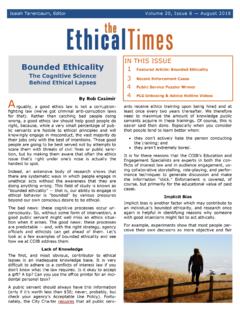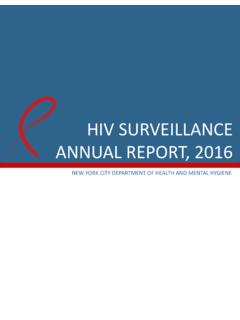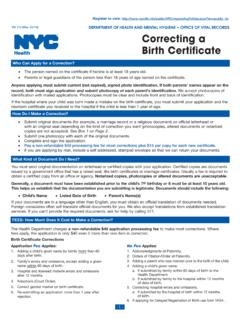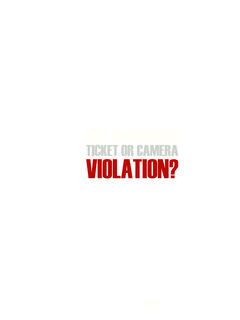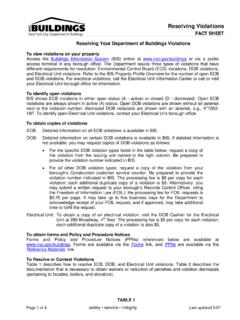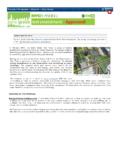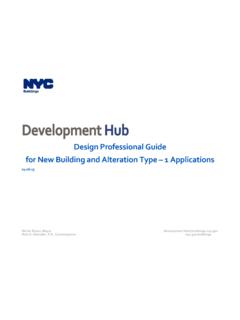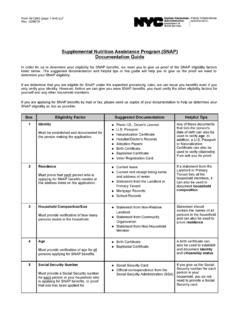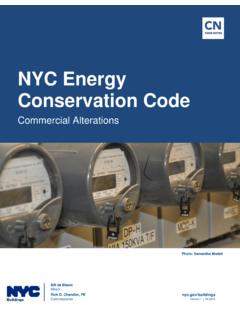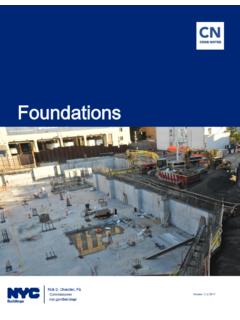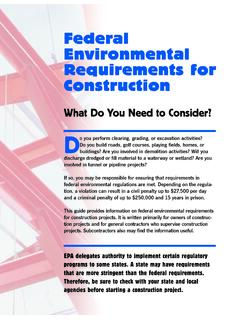Transcription of Demolition & Site Safety Plan Minimum Requirements
1 Demolition & Site Safety Plan Minimum Requirements Course Number SW0417 John Chiusano, RA Erik Jostock, RA May 3, 2017 Credit(s) earned on completion of this course will be reported to AIA CES for AIA members. Certificates of Completion for both AIA members and non-AIA members are available upon request. This course is registered with AIA CES for continuing professional education. As such, it does not include content that may be deemed or construed to be an approval or endorsement by the AIA of any material of construction or any method or manner of handling, using, distributing, or dealing in any material or product. _____ Questions related to specific materials, methods, and services will be addressed at the conclusion of this presentation.
2 COPYRIGHT MATERIALS This presentation is protected by US and International Copyright laws. Reproduction, distribution, display and use of the presentation without written permission of the speaker is prohibited. NYC Department of Buildings 2017 COURSE DESCRIPTION This course will explain how to file site Safety and Demolition plans with the Department of Buildings under the new 2014 Code. It will go over the Code revisions to show what is to be expected as far as the new Requirements , when and which code to apply to your project. Also it will help explain how and what forms are required. This course will be 1 hour and 10 minutes long. The first 50 minutes will be a power point presentation and discussion followed by 20 minutes of Q&A.
3 This course is 1 LU hour and will fall under the Health Safety and Welfare learning units. LEARNING OBJECTIVES At the end of the this course, participants will be able to: will be familiarized with the site Safety & Requirements contained in article 28-110 & Chapter 33 of the NYC Building Code. will be familiarized with the Demolition Requirements contained in Chapter 33 of the NYC Building Code. will review and be able to determine when to apply RCNY 3310-01 will discuss individual roles in the site Safety environment in order to mitigate Safety concerns on a construction project. Demolition PLANS HOW TO FILE A FULL Demolition PLAN 01. File application in the Borough and pay all required fees 02.
4 Bring the folder to the BEST Squad with four (4) sets of plans (two (2) log in cover sheets) 03. Review conducted by the BEST Squad 04. If approved then pre-demo is scheduled and conducted 05. If approved the permit is pulled 06. 24 hour notice call (212) 393-2550 07. Demo work starts 08. When Demolition work is completed the Contractor emails the BEST Demo Sign-Off at 09. BEST conducts sign-off inspection 10. Sign-off is entered into BIS Minimum CONTENT To help the Applicant and Contractor get a first time approval we ve created a guide to what is needed on a Demolition submittal COMMON Demolition SUBMITTAL MISTAKES information on the cover log in cover sheet on the under the wrong address or BIN COMMON Demolition SUBMITTAL MISTAKES COMMON Demolition SUBMITTAL MISTAKES forms filled out incorrectly or missing B Form 2A: BEST Pre- Demolition Inspection Application BEST4 Application: BEST Recommendation for Mechanical Means Demolition DS1: Demolition Submittal Certification Form B2A.
5 PRE- Demolition INSPECTION FORM All Demolition applications must be pre-filed prior to requesting a pre- Demolition inspection from BEST BEST will only accept applications for inspection prior to Demolition (B Form 2A) with the nine digit BIS job number on the upper right hand corner of the form B2A: PRE- Demolition INSPECTION FORM If you choose to you can attach a separate drawing to this form to allow more room to clearly reflect the proposed work BEST 4: MECHANICAL Demolition FORM BEST Recommendation for Mechanical Means Demolition To request a recommendation for mechanical means Demolition , you must complete and submit a BEST 4 form to BEST at time of submittal of pre- Demolition application.
6 The Borough Commissioner s approval is still required after receiving BEST recommendation. DS1: Demolition SUBMITTAL FORM MUST be submitted by the person preparing Demolition Submittal Plans Items 3A & 3B indicate the following: Full or Partial Demolition If hand held tools will be used Mechanical Equipment only If the work is from the interior or exterior Give a make & model of mechanical equipment with its intended use Don t mark hand held mechanical equipment this is an 2008 Code reference. COMMON Demolition SUBMITTAL MISTAKES photos are inadequate or missing At a Minimum of one per exposure COMMON Demolition SUBMITTAL MISTAKES missing around the site or adequate pedestrian protection or inadequate adjoining property protection Demolition sequence COMMON Demolition SUBMITTAL MISTAKES materials not indicated on the plan and sections COMMON Demolition SUBMITTAL MISTAKES materials not indicated on the plan and sections COMMON Demolition SUBMITTAL MISTAKES of Demolition conditions not shown COMMON Demolition SUBMITTAL MISTAKES of Demolition conditions not shown COMMON Demolition SUBMITTAL MISTAKES of Demolition conditions not shown
7 COMMON Demolition SUBMITTAL MISTAKES SITE Safety TYPES OF SITE Safety PLANS Safety for NBs 10 stories or 125 feet in height or more Safety for Local Law fa ade work on buildings 15 stories or 200 feet in height or more on existing buildings where you add or remove 1 or more floors on an existing building or completely remove the fa ade on a building 10 stories or 125 feet in height New building with lot coverage of 100,000 sf or more project that the Commissioner deems to be site Safety FILING SITE Safety PLANS the four (4) sets of plans to the BEST Squad (two (2) log in cover sheets) a PDF of the Plans and one (1) log in cover sheet to BEST Plan Exam See industry notice on our home page law Fa ade plans only they can be professionally certified by a licensed professional and emailed to SSP Facade See industry notice on our home page SITE Safety PLAN Requirements Under Article 110 Site Safety Plans and Currently there are 21 items listed under this Article.
8 SITE Safety PLAN Requirements under the incorrect address COMMON LOCAL LAW Safety PLAN MISTAKES or missing pedestrian protection Buildings over 100 require 20 of sidewalk shed beyond the point of work or missing Adjoining property protection COMMON LOCAL LAW Safety PLAN MISTAKES not show how the work will be accessed on the plan and elevation. COMMON LOCAL LAW Safety PLAN MISTAKES to show both your building and the adjoining buildings correctly. COMMON LOCAL LAW Safety PLAN MISTAKES not show phases of work correctly. COMMON LOCAL LAW Safety PLAN MISTAKES COMMON NB SITE Safety PLAN MISTAKES information on the cover sheet under incorrect address or vanity name (The Diamond Tower) meeting the Minimum set forth on the check list or inadequate pedestrian protection showing all elements on the excavation/Foundation phase COMMON NB SITE Safety PLAN MISTAKES guardrails during excavation and foundation adequate means of egress jump schedule for horizontal nets showing the adjoining building correctly or incorrectly protection the adjoining properties Minimum CONTENT The first and second pages on Site Safety is the Cover Sheet and the General Note page.
9 Minimum CONTENT All Safety plans must show the following pedestrian protection: Location of all construction fences around work site, with location of fence panel indicated; Location of all gates in construction fences, with a clear designation that the gate is either sliding or inward swinging; Location of all street and sidewalk closings; Location of all sidewalk sheds, with sidewalk shed signage indicated; Location of all temporary walkways and required overhead protection; Pedestrian and traffic control to be provided, including but not limited to location of flag persons Minimum CONTENT All Safety plans must show the following adjoining property: Adjoining buildings within 20 feet of the property lines, with occupancy, height, dimensions, projections, setbacks, entrances/exits, and equipment and structures located on the roof or setback indicated; Location and type of adjoining roof protection to be provided; and Location and type of adjoining yard protection to be provided, including controlled access zones Support of excavation (SOE) is the first phase of the two initial phases of a NB site Safety project.
10 It is filed with the Foundation Phase. There are additional Requirements for these two phases Location of all parts of the excavation and foundation Guardrails and protection of the excavation and foundation Egress out of the excavation and foundation Minimum CONTENT Minimum CONTENT Minimum CONTENT The next two phases are Super Structure below 75 and Super Structure above 75 . There are additional Requirements for these phases: Unenclosed perimeter protection location and type, including but not limited to Horizontal & Vertical nets, cocoon system, and catchalls, with details of the initial installation, and designated lifting areas where unenclosed perimeter protection will be omitted.
